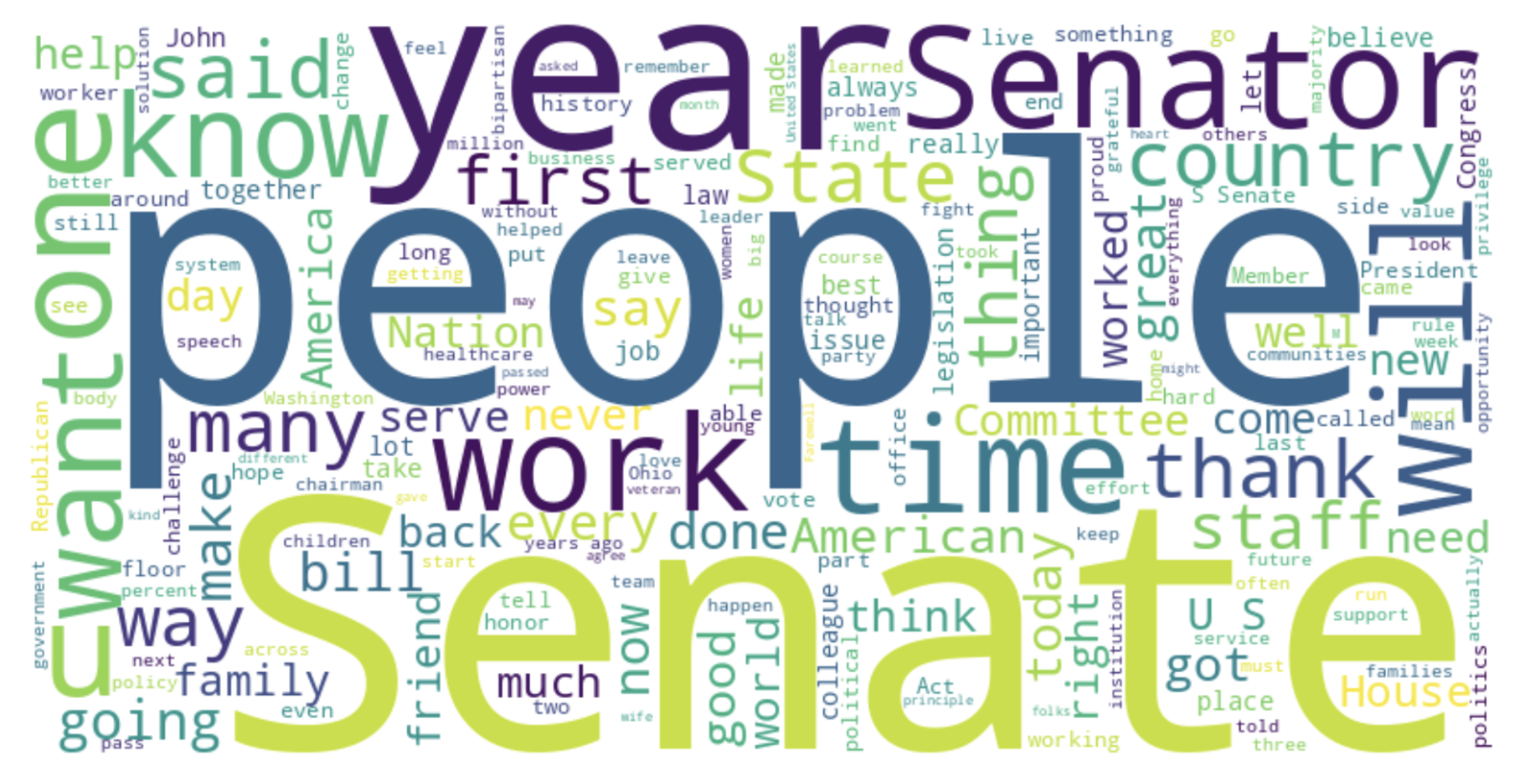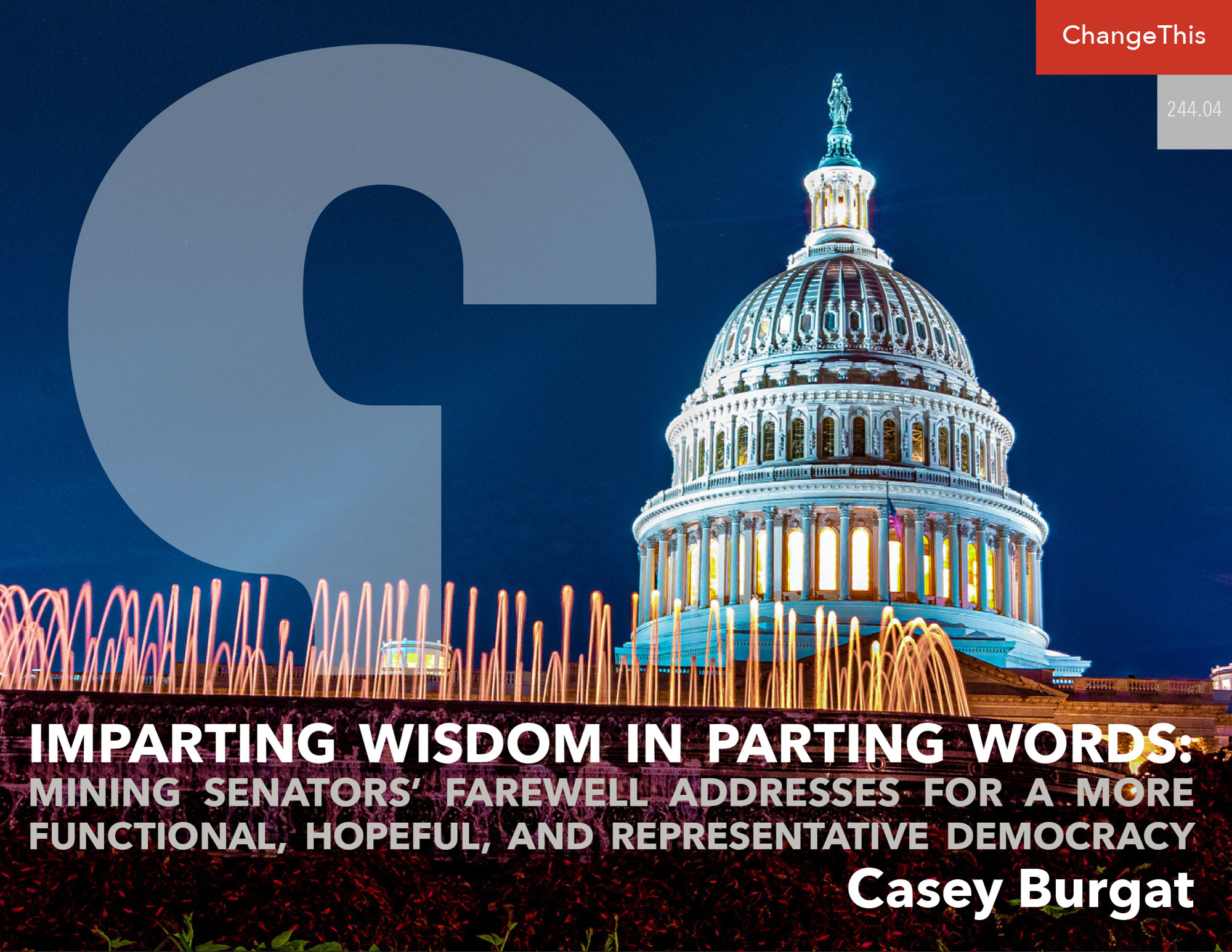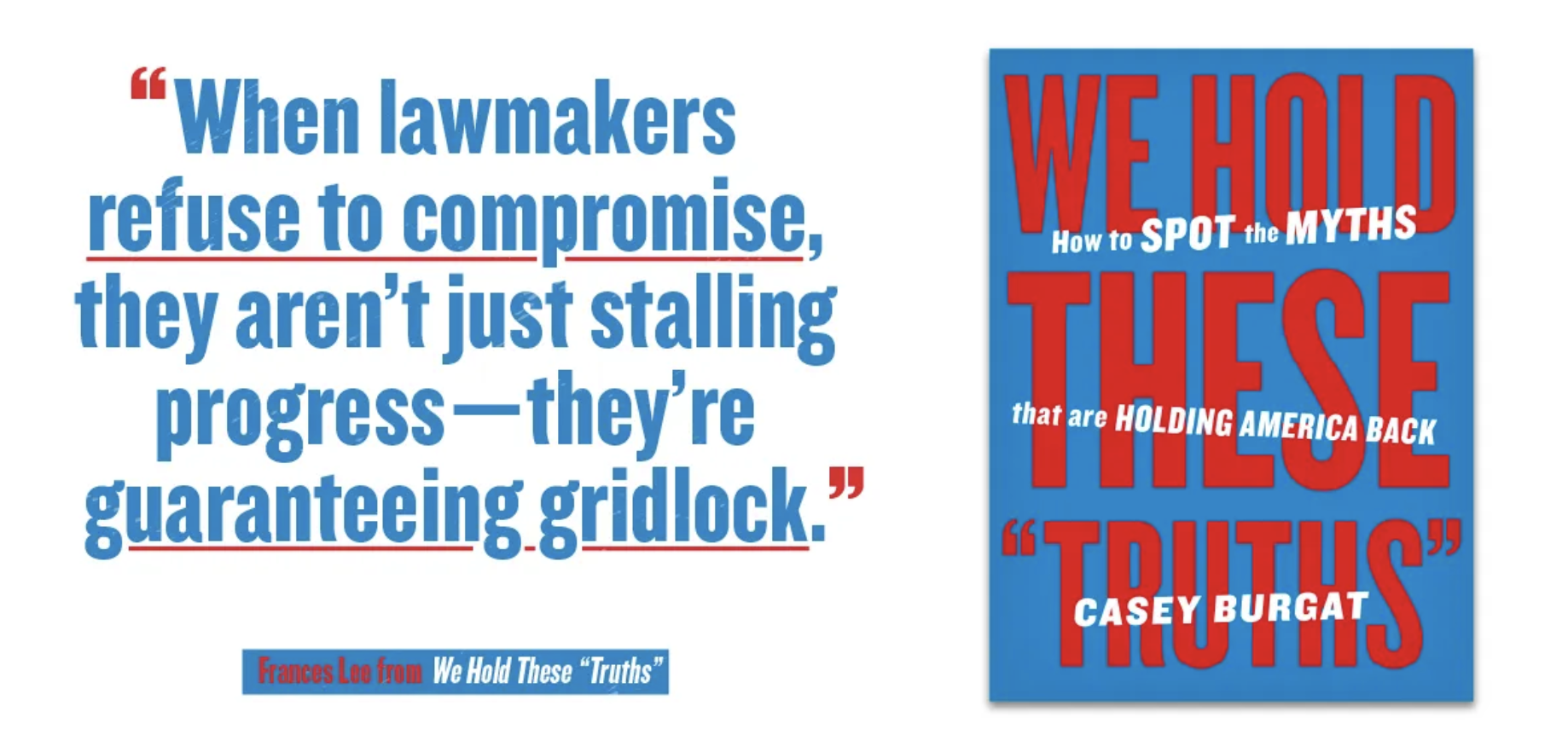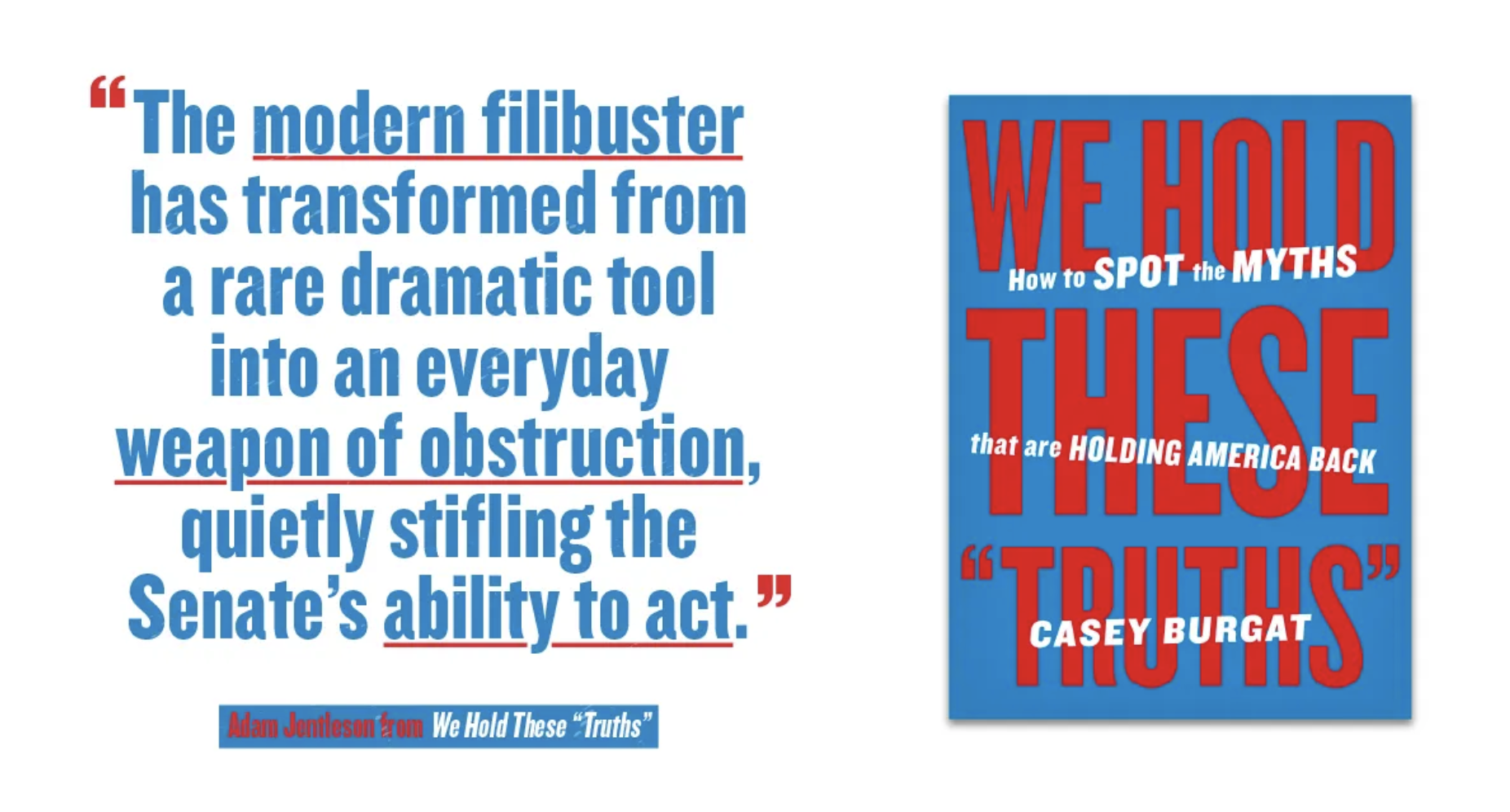Imparting Wisdom in Parting Words: Mining Senators’ Farewell Addresses for a More Functional, Hopeful, and Representative Democracy
I have an embarrassing confession: I’m an absolute sucker for those stories offering end-of-life wisdom. You know the ones: “108 year old shares her longevity secrets.” CLICK. “Billionaire admits regrets on way to the top.” GIMME.
It doesn’t have to be celebrities, titans of industry, or world leaders, either. In fact, I think I prefer those life look backs from the everyman and woman—normie recognizes normie. I’m able to put myself in the shoes of the Average Joe much better than I am someone who doesn’t remember what it’s like to fly coach.
There’s something uniquely captivating about the pearls of wisdom offered by those who know their time is short—when the anxieties and fears that once crowded their judgment have given way to clarity. Where the rat race is finally over. In those final moments, what emerges is often raw, unvarnished truth: reflections on what truly mattered, what they wished they had done differently, and the lessons they hope to impart before they’re gone. These parting words give us holistic insights from a life already lived. We’re handed a cheat sheet of sorts—a way to benefit from their mistakes without having to make them ourselves.
For me, these moments evoke the same emotional pull as those videos of service members surprising their families after a long deployment. No matter how many times I see them, my eyes always somehow get a little dust in them. There’s an authenticity, a gravity, that’s impossible to fake. They are mini-legacies, reservoirs of raw emotion and hard-earned insights that will outlast the author.
Read George Washington’s farewell address, written at a time when our country’s preeminent founding father was voluntarily retiring, thrusting the shaky United States of America into a future without him at the helm. His words were meant to guide a fledgling nation, and they remain a timeless example of leadership under uncertainty.
As a former congressional staffer turned graduate school professor at George Washington University, I live and breathe politics. My work focuses on finding practical ways to make Congress and our government function more effectively. And lucky for me, the United States Senate has a tradition that combines my two obsessions: politics and farewell advice. At the very end of each Congress, every Senator who is departing the chamber— whether by choice or circumstance—is granted as much time as they wish to deliver their Farewell Address to the Senate, Congress, and the nation. Their words are printed in the Congressional Record for history.
For most, these are political obituaries—heartfelt goodbyes and thank-yous from powerful figures unlikely to hold office again. Some, like Senator John McCain’s (R-AZ) farewell, were carefully crafted as a final public statement, with the full knowledge that their words would carry lasting weight.
Each of these lawmakers are delivering their own version of a final dispatch. Their speeches are not just ceremonial goodbyes, a chance to say thank you to their staff, colleagues, and constituents (though every speech does these three things); they are a window into the soul of public service. They reveal the lessons learned from years spent navigating the labyrinth of American governance. They lay bare their regrets, their triumphs, and their hopes for the future.
And for a sappy politics nerd like me, these addresses are pure gold. So, I collected them. Nearly 50 Senatorial Farewell Addresses, dating back to 2018. And then I examined them to uncover the common threads that bind these Senators–Republican and Democrat– together. I set out to find not just personal anecdotes or reflections, but also the broader lessons these senators chose to spotlight at the end of their political careers. What do their parting words say about the institution of Congress itself? What do they reveal about the challenges and opportunities of governing? By aggregating their thoughts, I hoped to distill a collective wisdom that could offer valuable insights—not just for political insiders, but for anyone invested in the future of American democracy.
And for those of us watching and studying from the outside, these speeches offer something invaluable: the distilled essence of experience, shared freely, before the curtain falls.
Here’s what I learned:
It’s always, always about the PEOPLE.
The very first thing I did after collecting each of the Farewell Addresses was to let AI generate a word cloud of the most commonly used words or phrases. This is what popped out.

Other than the word ‘Senate’ (duh), the single most frequently used word stood out as both incredibly simple and profoundly enlightening: PEOPLE.
This makes perfect sense. The very essence of the job of any representative is to do exactly that: represent the people. The people—constituents, whether or not they are voters or supporters—are the heart of every motivation, every calendar packed with constituent meetings, every long night debating policy. It’s how the system is designed to work: a government by, for, and about the people. As Senator Debbie Stabenow (D-MI) put it, “To the people of Michigan, thank you for placing your trust in me to represent your voices in this chamber. Every decision I made was guided by the people I served, and I’m forever grateful for the honor.”
But the people theme didn’t only refer to those back home. A recurring theme was a deep appreciation for their colleagues—the people they worked alongside to deliver for their constituents. This appreciation wasn’t limited to their own party; many senators highlighted the value of reaching across the aisle to create meaningful change.
Senator Mitt Romney (R-UT) exemplified this sentiment: “My biggest surprise in the Senate has been how much I enjoy the other Senators on both sides of the aisle. Among you are some brilliant, entertaining, kind, generous, and patriotic individuals. It is an honor to have been able to serve with you.”
The camaraderie among colleagues, even amidst fierce debates, was often credited for making the experience of serving in the Senate richer and more rewarding. Senators seemed united in the belief that their best work happened when partisanship was set aside, and collaboration took center stage.
Finally, almost every senator expressed gratitude for the anonymous and unsung staffers who supported their work. These individuals were acknowledged as the lifeblood of the Senate, enabling the legislative process to move forward even in the most challenging circumstances. Senator Kyrsten Sinema (I-AZ) summed it up best: “To the floor staff, the Sergeant at Arms, the Capitol Police, and the countless aides who keep this institution running, thank you for your dedication. You are the unsung heroes of democracy, ensuring that the Senate fulfills its mission every single day.”
Whether it was the people they represented, the colleagues who walked alongside them, or the staffers working tirelessly behind the scenes, senators consistently returned to the same fundamental truth: politics is about people. It’s a message as old as democracy itself, and one worth repeating as we reflect on their service.
THE NEGATIVE IS REPLACED BY THE HOPEFUL
All of these senators were, without question, political beings. They wouldn’t have been elected if they weren’t. They engaged in partisan brinksmanship, took sharp jabs at the other side, and participated in the daily grind of political combat. Many of them expressed deep frustration at the lack of progress on big challenges and how often politics seemed to obstruct solutions. Senator Joe Manchin (D-WV) famously quipped, “This place sucks,” referring to the Senate’s inability to rise above gridlock and deliver results.
Yet, when it came time to deliver their farewell speeches, all of that negativity—the frustration, the conflict, the weariness—was transformed. In those moments, the sharpness of daily politics softened, and senators’ focus turned to optimism, hope, and belief in the possibilities of the future.
Senator Mitt Romney (R-UT) reflected this shift, saying, “Senator Richard Shelby (R-AL): “I leave this chamber with confidence in the future. The challenges we face are great, but so are the people of this country. Together, we have always found a way forward, and I believe we always will.”
Senators acknowledged the difficulties and shortcomings of the institution but often reframed them as challenges to be overcome, rather than barriers to progress. Optimism shone through as they spoke of the resilience of democracy, the strength of the American people, and the potential for future leaders to rise to the occasion.
Senator Debbie Stabenow (D-MI) captured this sentiment beautifully: “Despite the challenges we face, I see hope all around me. From the people in Michigan who are working every day to make their communities stronger to the young leaders stepping up to shape our future, I leave knowing that America’s best days are still ahead.”
For senators who had spent years immersed in the frustrations of the political process, the act of leaving seemed to bring clarity. Their words became not just a reflection on their time in office but a call to embrace the opportunities that lay ahead. It’s a reminder that even in the hardest moments of political life, hope has a way of enduring.
PLEAS FOR CIVILITY AND PROTECTING DEMOCRACY
In their farewell speeches, senators repeatedly returned to a sobering theme: the erosion of civility in American politics and the urgent need to restore it. They recognized the political moment we’re in, where civility—a bedrock of functioning democracies—too often takes a back seat to short-term partisan gains. The implications are profound, not just for the work that must be done in the Senate chambers, but for how Americans engage with and treat one another in their daily lives.
Senator Lisa Murkowski (R-AK) spoke directly to this point: “Civility is not just a nicety; it’s the foundation upon which trust and collaboration are built. Without it, our institutions falter, and the faith of the people in their government erodes.”
The senators understood that the absence of civility has consequences beyond the walls of Congress. When citizens see their leaders prioritize partisanship over dialogue, it sets a tone for division, rather than unity, in communities across the country. This dynamic, left unchecked, threatens to fray the social fabric that holds democracy together.
Senator Dianne Feinstein (D-CA) framed civility as essential for both legislative progress and the health of the nation: “We can disagree without being disagreeable. The people we represent expect us to work together, to listen, to find common ground. It is not just a responsibility; it is a necessity.”
Many senators also tied this call for civility to the preservation of democracy itself. They acknowledged the fragile nature of democratic institutions and warned against taking them for granted. Senator Ben Sasse (R-NE) underscored this point: “Democracy is not inevitable—it must be cultivated. That starts with how we treat one another, both in this chamber and across the country.”
Restoring civility, they argued, isn’t just about improving the tone in Washington—it’s about modeling for Americans what a functioning democracy looks like: one where debate is robust but respectful, disagreements don’t devolve into demonization, and the common good remains the ultimate goal. As Senator Jon Tester (D-MT) put it, “We have to remember that the person on the other side of the aisle, or across the dinner table, is not the enemy. They are our fellow Americans, and we need to start acting like it.”
These pleas are both a call to action and a reflection of what’s been lost. If civility can be reclaimed, the senators suggest, the path forward—for the chambers of Congress and the country itself—becomes infinitely more promising.
COMPROMISE IS THE ONLY WAY
In an era of hyperpolarization, where ideological divides seem insurmountable, a surprising truth persists: to get anything done in Congress, compromise is essential. Despite the partisan warfare that often dominates headlines, senators from both sides of the aisle repeatedly emphasized the necessity of negotiation and collaboration in their farewell speeches. It’s a counterintuitive reality in our current political climate, but one that remains foundational to the functioning of American democracy.
This theme aligns seamlessly with the “Bipartisanship is Dead” chapter from my forthcoming book on political myths. Despite pervasive headlines declaring the demise of bipartisanship, the reality is more nuanced. For lawmakers dedicated to enacting legislation rather than chasing soundbites, compromise remains the indispensable path forward. The legislative process, by design, requires negotiation and collaboration, making compromise not just beneficial but essential for progress.
Senator Rob Portman (R-OH) underscored this point: “The most significant accomplishments I’ve been a part of—from infrastructure to combating the opioid epidemic—came from sitting down with colleagues from both parties, finding common ground, and putting the country first. That’s how real change happens.”
This bipartisanship sentiment was echoed by Senator Joe Manchin (D-WV), who is no stranger to crossing the aisle to craft (or shut down) deals: “You don’t have to agree on everything—you just need to agree on something. Real progress happens when you’re willing to sit down, listen, and find a path forward, even when it’s hard.”
Compromise doesn’t mean abandoning principles; it means recognizing that governing is about balancing competing interests to achieve results that serve the greater good. Senators acknowledged that this process often requires difficult conversations, trade-offs, and patience. It is slow, frustrating work, but it is also the essence of legislating in a diverse democracy.
Senator Lamar Alexander (R-TN) reflected on this with a dose of humility: “I’ve learned that the best solutions are rarely found at the extremes. They’re in the middle, where both sides give a little to gain a lot.”
In their speeches, senators often pointed to their proudest legislative achievements as proof of the power of compromise. Whether it was major infrastructure investments, healthcare reforms, or protections for marginalized communities, these victories were rarely the product of one side winning over the other. They were the result of both sides coming together.
The lesson is clear: even in an age of hyperpolarization, compromise is not a weakness— it’s a necessity. It is the only way to govern effectively, to build lasting solutions, and to ensure that democracy continues to work for the people it serves. As Senator Kyrsten Sinema (I-AZ) aptly put it, “You can’t move history forward by tearing everything down. You do it by building relationships, finding consensus, and choosing the hard work over the easy win.”
ACKNOWLEDGING THE NEED FOR REFORMS
In their farewell speeches, many senators candidly admitted that the Senate—or politics more broadly—is far from perfect. While they took pride in the institution and its role in American democracy, they also recognized its flaws and the need for reforms. These acknowledgments reflect an understanding that the Senate, like any institution, must evolve to meet modern challenges and better serve the American people.
Senator Tom Udall (D-NM), for example, called for changes to campaign finance laws, saying, “Our democracy cannot survive the corrosive influence of unlimited, undisclosed money in our elections. It’s up to us to restore faith in the process by enacting reforms that protect the voices of everyday Americans.”
Senators didn’t just identify problems—they called on their colleagues to rise to the challenge of fixing them. They recognized that a stagnant Senate, bound by outdated norms or paralyzed by partisanship, cannot fulfill its purpose. Senator Jeff Flake (R-AZ) emphasized this responsibility: “The Senate must become a place where meaningful debate occurs and where the filibuster is used to protect the minority, not to obstruct progress.” Sen. Flake’s point, again, fits perfectly with another myth debunked within my book that “The Filibuster Forces Compromise.”
These calls for reform extended beyond procedural issues. Senators also highlighted the broader political climate, urging their successors to prioritize transparency, accountability, and a renewed focus on the common good.
Senator Jon Tester (D-MT), reflecting on his tenure, remarked, “Campaign finance reform is not optional—it’s essential. The division and dysfunction we see today can be traced back to a system that prioritizes big money over big ideas.”
For these senators, reform wasn’t about undermining the Senate’s traditions or ideals but about preserving and strengthening its ability to govern effectively. Their parting words were both a critique of the status quo and a rallying cry for improvement. As Senator Richard Shelby (R-AL) put it, “This institution has weathered many storms, but it must adapt to face the challenges of the future. That is the responsibility of those who serve in these chambers.”
These admissions and appeals reflect a belief that reform is not a sign of failure but of commitment to the principles of democracy. In their view, it is the duty of those serving to leave the Senate better than they found it, ensuring that it remains a vital and productive force for the nation.
CONCLUSION
These farewell speeches, collectively, offer something rare in today’s political climate: a moment of introspection, humility, and clarity. They are a window into the minds of those who have spent years navigating the messy, frustrating, and rewarding business of American governance. The themes that emerged—putting people first, finding optimism in the face of negativity, prioritizing civility, embracing compromise, and calling for reform— reveal a deeper truth about our political system. Beneath the hyper-partisan rhetoric and the daily skirmishes, there is still a belief in the possibility of a better way forward.
But how do we get there? How do we begin to fix what feels unfixable? A good place to start is by returning to the foundations—by challenging the assumptions we hold about our system and recognizing that too much of what we think we know about politics is incomplete, or outright wrong. Correcting these misconceptions is the paramount first step toward building a better political future.
That’s why I wrote We Hold These Truths: How to Spot the Myths that are Holding America Back. The myths about bipartisanship, the filibuster, and even the fundamental nature of representation are obstacles to progress because they distort how we engage with our system. By identifying and addressing these falsehoods, we can better understand the challenges ahead and find new ways to work together.
I invite you to read the book, engage with its arguments, and join me in the work of applying its insights. Together, we can challenge these myths and lay the groundwork for a more functional, hopeful, and representative democracy. Because, as these senators reminded us in their parting words, the future of our system isn’t inevitable—it’s what we make of it. Let’s get to work.






